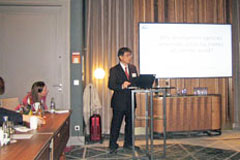Towards More Effective Approach for Development Cooperation: JICA-RI’s Fushimi Discusses at Conference Hosted by World Bank and GIZ
2019.02.12
An international conference titled “Global Delivery Initiative (GDI) and Doing Development Differently (DDD) Network Conference — Responding Differently to the Changing Dimensions of the Development” was held in Berlin, Germany on Jan. 17 and 18, 2019. GDI is a knowledge platform for the international development community led by the World Bank Group, with the participation of numerous development cooperation organizations, NGOs and research institutions. Focusing on the questions “What works?”, “Why?” and “How?”, GDI attempts to perform systematic analysis and shares the results. In specific terms, the activities it carries out consist of categorizing cross-cutting implementation issues (“delivery challenges”) related to development projects, organizing knowledge of what works, and sharing it with development practitioners. Additionally, it aims to provide the practitioners with useful knowledge and human resources in a timely manner for better project implementation.
This conference was hosted by the World Bank Group and the German Society for International Cooperation (GIZ), which are co-chairs of GDI. This conference was attended by approximately 100 development practitioners from international organizations, bilateral development cooperation agencies, think tanks, universities, NGOs, NPOs, and consulting firms. Participants discussed various issues with the awareness that conventional development cooperation has not improved the function of governments in developing countries because it sticks to the transplantation of best practices from developed countries and imposes strict controls on pre-designed plans. Katsutoshi Fushimi, assistant director of the JICA Research Institute (JICA-RI), was among those who attended.
Fushimi served as the chair of the session titled “Effective Adaption: Project Work and Strategic Decision Making,” and made a presentation at a breakout session.
During the breakout session, Fushimi commented on his hypothesis that “The reason that flexible project management cannot be mainstreamed by development organizations is that accountability to stakeholders in their own country is given priority over aid efficacy in developing countries,” by giving a summary of his literature review titled “The Puzzle of the Universal Utilization of the Logical Framework Approach: An Explanation using the Sociological New Institutional Perspective.” In explaining his hypothesis, he utilized three concepts from the sociological new institutional perspective: the fact that the surrounding environment determines the behavior of an organization (“rational institutional myths”), the phenomenon in which organizations accept and superficially adopt practices without incorporating them in a substantial way (“decoupling”), and the idea that organizations become increasingly similar in their practices when placed in the same institutional environment (“institutional isomorphism”). He went on to argue that the fact that development cooperation organizations universally utilize log frames all over the world is due to a variety of environmental pressures, and that in order to make a breakthrough, there is no choice but to create an evidence-based environment that requires the adoption of a flexible approach. Furthermore, because JICA-RI has been considering the establishment of empirical research and case study research to show the effectiveness of a flexible approach, Fushimi called on attendees to contact the Institute if they were interested.

Katsutoshi Fushimi, assistant director of JICA-RI, gave a presentation
The state of development cooperation as presented at this conference was resonant with the approach already emphasized by Japan — the support for the self-help efforts of partner countries and working together to co-create solutions. JICA-RI actively continues its efforts to communicate the effectiveness of a Japanese-style development approach.

事業事前評価表(地球規模課題対応国際科学技術協力(SATREPS)).国際協力機構 地球環境部 . 防災第一チーム. 1.案件名.国 名: フィリピン共和国.

事業事前評価表(地球規模課題対応国際科学技術協力(SATREPS)).国際協力機構 地球環境部 . 防災第一チーム. 1.案件名.国 名: フィリピン共和国.

事業事前評価表(地球規模課題対応国際科学技術協力(SATREPS)).国際協力機構 地球環境部 . 防災第一チーム. 1.案件名.国 名: フィリピン共和国.

事業事前評価表(地球規模課題対応国際科学技術協力(SATREPS)).国際協力機構 地球環境部 . 防災第一チーム. 1.案件名.国 名: フィリピン共和国.

事業事前評価表(地球規模課題対応国際科学技術協力(SATREPS)).国際協力機構 地球環境部 . 防災第一チーム. 1.案件名.国 名: フィリピン共和国.
scroll